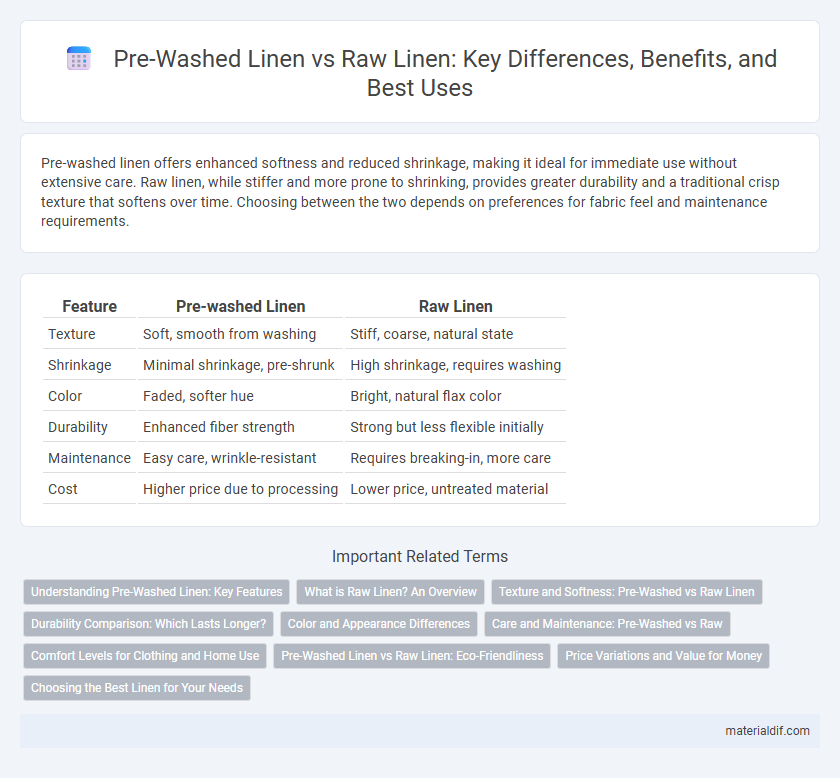Pre-washed linen offers enhanced softness and reduced shrinkage, making it ideal for immediate use without extensive care. Raw linen, while stiffer and more prone to shrinking, provides greater durability and a traditional crisp texture that softens over time. Choosing between the two depends on preferences for fabric feel and maintenance requirements.
Table of Comparison
| Feature | Pre-washed Linen | Raw Linen |
|---|---|---|
| Texture | Soft, smooth from washing | Stiff, coarse, natural state |
| Shrinkage | Minimal shrinkage, pre-shrunk | High shrinkage, requires washing |
| Color | Faded, softer hue | Bright, natural flax color |
| Durability | Enhanced fiber strength | Strong but less flexible initially |
| Maintenance | Easy care, wrinkle-resistant | Requires breaking-in, more care |
| Cost | Higher price due to processing | Lower price, untreated material |
Understanding Pre-Washed Linen: Key Features
Pre-washed linen offers enhanced softness and reduced shrinkage compared to raw linen due to its factory treatment process. The fabric's texture becomes smoother and more breathable, making it ideal for immediate use in clothing and home textiles. Unlike raw linen, pre-washed linen maintains consistent coloration and durability after multiple washes, ensuring long-term comfort and aesthetic appeal.
What is Raw Linen? An Overview
Raw linen is the fabric in its natural, untreated state, maintaining its original stiffness and coarse texture before undergoing any washing or softening processes. Unlike pre-washed linen, raw linen retains natural impurities such as small bits of flax straw and requires washing to achieve a softer, more durable feel suitable for clothing or home textiles. Its unprocessed quality offers greater potential for customization and personalization, as it can be dyed, softened, or blended according to specific textile needs.
Texture and Softness: Pre-Washed vs Raw Linen
Pre-washed linen offers a softer texture and a more pliable feel due to the washing process that removes stiffness and natural residues from raw fibers. Raw linen maintains a coarser, more rigid texture as the fibers are untreated, providing a sturdy and crisp fabric ideal for structured garments or home decor. Over time, pre-washed linen continues to soften with each wash, enhancing comfort and breathability compared to the initial roughness of raw linen.
Durability Comparison: Which Lasts Longer?
Pre-washed linen demonstrates greater durability compared to raw linen due to its softened fibers and pre-shrunk weave, reducing the risk of fabric weakening over time. Raw linen, while initially stiffer and stronger, is prone to shrinkage and fiber breakage during the first washes, which may shorten its lifespan. Consistent care and washing methods significantly influence the longevity of both pre-washed and raw linen fabrics.
Color and Appearance Differences
Pre-washed linen exhibits a softer texture and muted, vintage-like colors due to the washing process that removes excess starch and impurities. Raw linen maintains a stiffer feel with brighter, more natural hues, showcasing its untreated, organic fibers. Over time, pre-washed linen develops a worn-in patina, while raw linen alters its appearance as it softens with use and cleaning.
Care and Maintenance: Pre-Washed vs Raw
Pre-washed linen offers easier care and maintenance due to its softened fibers and reduced shrinkage, allowing for immediate use and simpler washing instructions. Raw linen requires careful handling, including gentle washing in cold water and gradual breaking in to avoid stiffness and excessive shrinkage. Choosing pre-washed linen minimizes fabric wear and extends garment lifespan compared to raw linen's need for meticulous care to maintain quality.
Comfort Levels for Clothing and Home Use
Pre-washed linen offers enhanced softness and reduced stiffness, making it ideal for clothing and home textiles that require immediate comfort. Raw linen retains a crisp texture initially but softens progressively with use and washing, providing durability suited for upholstery and durable home goods. Choosing between pre-washed and raw linen depends on the desired balance between instant comfort and long-term fabric resilience.
Pre-Washed Linen vs Raw Linen: Eco-Friendliness
Pre-washed linen undergoes a water-intensive washing process that reduces natural stiffness, improving softness but increasing its environmental impact compared to raw linen. Raw linen, unprocessed and untreated, retains its natural fibers and requires significantly less water and fewer chemicals, making it a more eco-friendly choice. Choosing raw linen supports sustainable practices by minimizing water consumption and chemical use, reducing the overall carbon footprint of textile production.
Price Variations and Value for Money
Pre-washed linen typically costs 15-30% more than raw linen due to the labor-intensive washing process that softens the fabric and reduces shrinkage. Raw linen offers a lower initial price but may require additional treatments and care, potentially increasing its total cost over time. For long-term value, pre-washed linen provides enhanced durability and comfort, justifying the upfront premium with greater ease of maintenance and reduced wear.
Choosing the Best Linen for Your Needs
Pre-washed linen offers enhanced softness, reduced shrinkage, and increased durability, making it ideal for immediate use in clothing and home textiles. Raw linen, characterized by its stiffness and natural texture, provides greater customization options and is preferred for artisanal projects and heavy-duty applications. Selecting between pre-washed and raw linen depends on the desired fabric feel, maintenance preferences, and specific end-use requirements for optimal performance.
Pre-washed Linen vs Raw Linen Infographic

 materialdif.com
materialdif.com